八年级Unit1 Period1
英语人教版八年级下册unit1 Section A 1a-1c教案设计
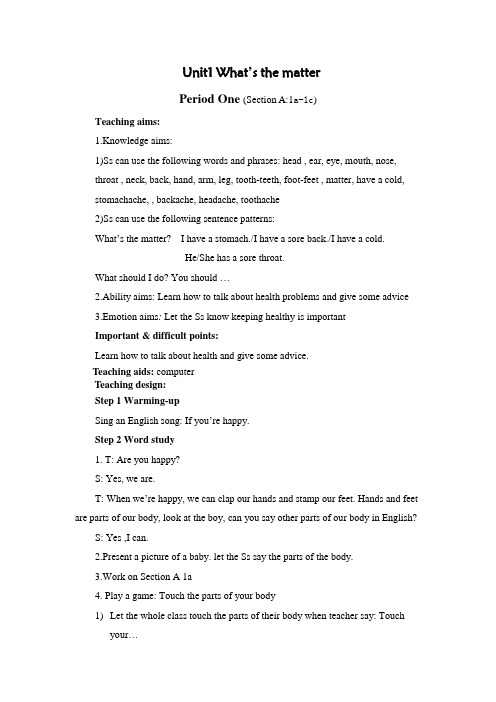
Unit1 What’s the matterPeriod One (Section A:1a-1c)Teaching aims:1.Knowledge aims:1)Ss can use the following words and phrases: head , ear, eye, mouth, nose,throat , neck, back, hand, arm, leg, tooth-teeth, foot-feet , matter, have a cold, stomachache, , backache, headache, toothache2)Ss can use the following sentence patterns:What’s the matter? I have a stomach./I have a sore back./I have a cold.He/She has a sore throat.What should I do? You should …2.Ability aims: Learn how to talk about health problems and give some advice3.Emotion aims: Let the Ss know keeping healthy is importantImportant & difficult points:Learn how to talk about health and give some advice.Teaching aids: computerTeaching design:Step 1 Warming-upSing an English song: If you’re happy.Step 2 Word study1. T: Are you happy?S: Yes, we are.T: When we’re happy, we can clap our hands and stamp our feet. Hands and feet are parts of our body, look at the boy, can you say other parts of our body in English?S: Yes ,I can.2.Present a picture of a baby. let the Ss say the parts of the body.3.Work on Section A 1a4. Play a game: Touch the parts of your body1)Let the whole class touch the parts of their body when teacher say: Touchyour…2)Ask six Ss to come to the front and do as the teacher tells them: Touchyour…if one does wrong, let him or her go back, the last one who in the front is the winner.(clap hands)Step 3 Presentation and practice1. T: Are you happy? Ss: Yes, we are.T: Look at the picture, is he happy?Ss: No, he isn’t.T: Why?(Help the Ss to answer: He has a stomachache.)2.Present other pictures, talk about health problems of the persons in the pictures. What’s the matter? He/She has a headache/ toothache /a sore back/ a sore throat/a cold and a cough.3. Let the Ss practice in pairs4. T: Suppose there is something wrong with your body .You may say: I have a headache. I have a sore throat.Step 4 ChantHead, head, I have a headache. I have a headache,Stomach, stomach, I have a stomachache. I have a stomachache,Ear, ear, I have an earache. I have an earache,Tooth, tooth, I have a toothache. I have a toothache.Back, back, I have a sore back. I have a sore back,Throat, throat, I have a sore throat. I have a sore throat.Oh, dear! Do more exercise, please and keep healthy!Step 5 listen and say1.Work on Section A 1b, listen and number the names 1-5.2.Listen again and talk about the health problems of the persons in the picture.Eg: Nancy has a toothache, Sarah has a cold,…Step6. PresentationGuessing gameThe teacher shows some part of the pictures to the Ss and let them guess .T: What’s the matter with him/her?S: Does he/she have a …?T: Yes, he/she has a cold. Can you give him/ her some advice? Whatshould he /she do?S: He /She should drink hot tea with honey/ shouldn’t speak more/ go to see a doctor… (Ss can give different advice as they like)T: What’s the matter with him/her?S: Does he/she have a …?T: Yes, he / she has a / an toothache /fever / headache / earache…Whatshould he /she do?S: He /She should go to see a dentist / shouldn’t eat ice cream/shouldn’tdrink cold water /lie down and rest / shouldn’t play basketball/ shoulddrink a lot of water./should see a doctor…Step7. PracticeGroup-work. Role play the conversations in 2b. Let the Ss read the conversations first. Then work in a group, make a new conversation .A: What’s the matter?B: My head feels very hot.A: Maybe you have a fever.B: What should I do?A: You should drink hot water and take some medicineStep 8 Summary。
人教版八年级上册英语-unit1-2教案

Unit 1 How often do you exercise?Period 1 New words learningTeaching Aims:1. Make students pronounce the words correctly.2. Make students recite the new words with Chinese meanings.Teaching procedure:1. Daily greeting2. Show teaching aims3. Teacher guides students to learn the new words.Step 1 T: Please read the new words in Unit one by yourself. Let us see who can pronounce the words best and who can read the most words. I will give you 10 minutes to do that. After that, I will ask some students to read the words.Ss learn by themselves:1. Ask Ss to read the new words by themselves by using the international alphabet.2. Make Ss listen to the tape and check if they can read the words correctly. Underline the words which they cannot pronounce or pronounce correctly.Teacher teaches:Teacher play the recoding and ask student check their pronunciations according to the tape.Step 2 T: Now you please read the words by yourselves. I will give you 10 minutes and then I will check your work.Ss learn by themselves:1. Ss read the new words, the teacher walk around the classroom and check if the Ss can read the words well.2. The teacher shows the new words on the blackboard, Ss close books and check by themselves then check with their deskmates.Teacher teaches:Check the pronunciations especially the poor students. And teacher should teach the difficult words.Step 3 T: Remember the new words. I will give you 15 minutes.Ss learn by themselves:1. Ss remember the new words2. Ss can use different ways to remember the new words.Teacher teaches:Teach some difficult words.4. Practice in classHave a dictation and ask Ss to write the new words on the exercise books.Teacher checks.Period 2 Section A(1a-2c)Teaching Aims:1. Grasp the main sentences and impressions in this period.2. Use the sentences to talk about how often you do things.Teaching procedureStep1. Daily greeting and show teaching aims. (1’)Step 2 PresentationComplete Activity 1a. (6’)1. First let the Ss discuss the picture and then ask the students to make a list of the different weekendactivities2. Next let two students talk about their own weekend activities and them tell their activities.3. Finally the teacher writes the activities on the blackboard. Teach them and let the students read loudly. Step 3 Listening practice. (8’)1. Listen to 1b twice. Write the letters from the picture. After listening ,learn the 6 words and introducethese words.2. Listen again and repeat loudly.3. Ss read loudly the listening materials for 3 minutes.Step 4 Present conversations.(5’)1. Read the conversation in pairsA: What do you usually do on weekends? B:I usually go to the movies.A: How often do you watch TV? B:I watch TV once a week .2. Make the new conversations.Step 5 Listening practice. (8’)1. Listen to 2a and 2b twice. First number the activities , then match the activities with the number of times.2. Listen again and repeat loudly (open)3. Ss read loudly the listening materials for 3 minutes.Step 6 Presentation(5’)Do Activity 2c.First let the Ss fill in the chart,then make their own dialogues according to the given conversation.Step 7 Class exersices:1)--____do you help the old man with the housework? --Once a week.A. How soonB. How longC. How oftenD. How many2) My mother _______surfs the Internet. She likes watching TV.A. doesn't hardly everB. hard everC. isn't hardly everD. hardly ever3) What are the _______ of your exams? A. answers B. problems C. results D. things4) -----What does she do on ________? -----She often go to the movies.A. Every weekB. a weekC. weekendD. weekends5) -------______do you do sports? --------I do sports every day.A. WhenB. What timeC. How longD. How often教學反思:Period 3 Section (3--4)Teaching Aims:1. Understand the main idea of this article.2. Learn to use the new words and expressions to talk about how often people do things.Teaching procedureStep 1. Daily greeting and show teaching aims. (1’)Step 2. Read the article carefully and fill in the blanks.(5’)Step 3. Read the passage again and underline some important words.(5’)Step 4. Read loudly alone for about 4 minutes. (4’)Step 5. Retell or recite (10’)Step 6. Discuss language difficulties in group to help each other.(5’)1. Discuss in groups2. Discuss in class3. The teacher explains.Step 7 Speaking and writing activities. (5’)Interview in groups and fill in the chart, then find out who is the best English student?Write a passage according to the filled chart.Step 8. Class exercisesA)根據句意,用括號內所給詞の適當形式填空。
人教版八年级上册英语习题课件Unit1Period1SectionA1a2d
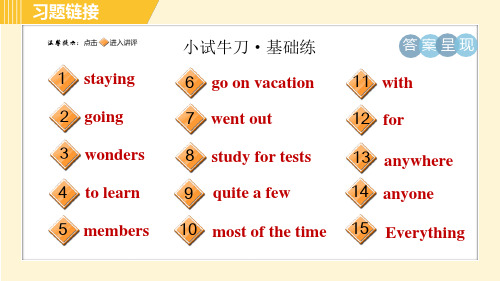
融会贯通·提升练
We’re staying in a camp, not far from Cape Town. Every day we wake ___u__p___22 early and leave the camp at 6 a. m. Our guide, Tony, takes us to different places. Yesterday, he took us to a river. There __w__e_r_e__23 different kinds of animals there, like elephants, lions, monkeys and giraffes. Before leaving, we saw something terrible.
Tomorrow we’re going to see ____a_n___25 African dance performance. It’s going to be fun.
I’ll be back home next Friday. See you soon. Yours,
William
习题链接
人教版高中英语同步练习:选修8 unit 1 period 1(含答案)(精修版)

人教版英语精品资料(精修版)Unit 1 A land of diversity Period 1 Warming Up,Pre-reading & Reading 同步精练(人教版选修8,课标通用)Ⅰ.介、副词填空1.Some of the president's advisers feared Hitler might declare war________the United States.2.We kept________our friendship for over twenty years.3.The old people died but the young ones lived________.4.He succeeded________means________perseverance.5.________the time he was ten, Tom had built a chemistry lab himself.6.She has two cars, and________addition, a motorboat.7.We hope the garden to keep________the weeds.8.Millions of people die________the illnesses caused by smoking.答案 1.on 2.up 3.on 4.by of 5.By 6.in7.down 8.fromⅡ.单词拼写1. He drew a quite artificial________(差别) between men and women readers. 2.Whisky contains a large________(百分比) of alcohol.3.Gradually she learned to make a joke of all these________(困难).4.The ________(部) of Transport made a searching enquiry to discover the cause of the plane crash.5.The oil market is enjoying a ________(繁荣).6.The ________(种族的) discrimination issue is a political hot potato. 7.Leonardo da Vinci is a famous artist in the ________(意大利) Renaissance.8.In the USA foreign policy is decided by the ________(联邦的) government. 9.The ________(大多数)of people seem to prefer TV to radio.10.He was ________(选举) chairman of the education committee.答案 1.distinction 2.percentage 3.hardships 4.Ministry 5.boom 6.racial7.Italian8.federal9.majority 10.electedⅢ.翻译与仿写1. However, it is likely that Native Americans were living in California at least fifteenthousand years ago.翻译:_____________________________________________________________ 仿写:这次会议有可能会由于天气原因而被推迟。
人教版八年级下册英语 Unit 1 习题课件 Period 1 Section A (1a-2c)

【点拨】used to do sth.“过去经常做某事” ,为固 定词组。根据后面的直接引语可知,这里是指 “疑问”。
Inthosedays, whenpeoplesawarunner, theyused______6, “Hey, what'sthehurry?” ortheymightsayto______7, “Ishecrazy?” Womenalmostnever______8. 7.AB. them B. themselvesC. theirs D. they
fruitjuiceorbread.My
______3
(I)
momisgoingshoppingnow.
Ihavesomemilk,
breadandaneggforb_r_e_a_k_f_a_s_t4.
It'simportanttohaveagoodbreakfast.
Ihaverice,
fishandvegetables______5lunch. for
toothache, what’sthematter, stomach, shtomuladc, h takeyourtemperature
toothache, what’s the matter, stomach, should, take your temperature
toothache, what’sthhoeumldatter, stomach, should, takeyourtemperature
toothache, what’s the matter,
译林版八年级上册英语Unit 1 单元词句梳理
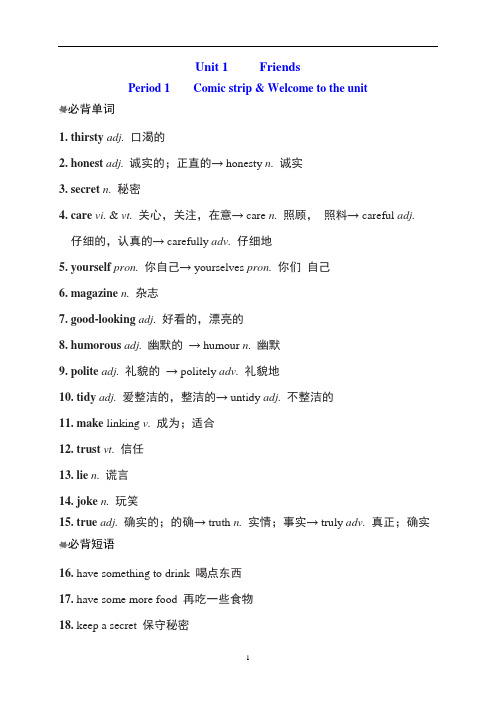
Unit 1 FriendsPeriod 1 Comic strip & Welcome to the unit必背单词1. thirsty adj.口渴的2. honest adj. 诚实的;正直的→ honesty n. 诚实3. secret n.秘密4. care vi. & vt.关心,关注,在意→ care n.照顾,照料→ careful adj.仔细的,认真的→ carefully adv. 仔细地5. yourself pron.你自己→ yourselves pron.你们自己6. magazine n.杂志7. good-looking adj. 好看的,漂亮的8. humorous adj. 幽默的→ humour n. 幽默9. polite adj. 礼貌的→ politely adv.礼貌地10. tidy adj.爱整洁的,整洁的→ untidy adj. 不整洁的11. make linking v. 成为;适合12. trust vt.信任13. lie n. 谎言14. joke n. 玩笑15. true adj.确实的;的确→ truth n.实情;事实→ truly adv.真正;确实必背短语16. have something to drink 喝点东西17. have some more food 再吃一些食物18. keep a secret 保守秘密19. make sb. happy 使某人开心20. share one’s joy 分享某人的快乐21. care about 关心;关怀22. tell him/her everything about yourself告诉他/ 她关于你自己的一切23. be ready to do sth.准备好/ 乐意做某事24. have problems with... ……有问题25. tell lies 撒谎26. tell sb. funny jokes 给某人讲滑稽的笑话必背句子27. Can I have something to drink, please?我能喝点儿东西吗?28. What about some milk?喝点儿牛奶怎么样?29. Can I have some more food?我能再吃一些食物吗?30. Maybe we can share it.也许我们可以分享它。
人教版八年级英语Unit1 Where did you go on vocation?period1
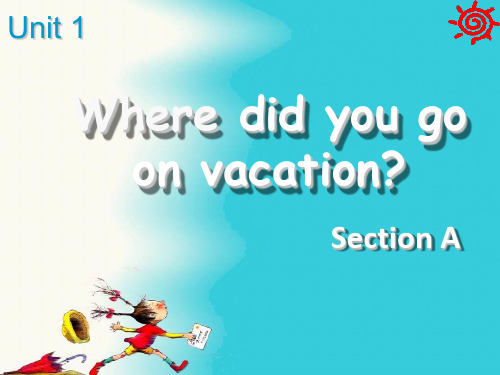
Where did you go on vacation?
Section A
Went to the beach took photos ate good food
东莞市常平中学初中部 向梓毅
I went to the beach.
a
I went to New York y) the computer games yesterday? 2.Who _________
3.We ________(go) to the movie last night. The film _____(be) went was
very good.
get (get) to school this morning? 4.What time _____ did you ______
-I /He/She went to summer camp.
询问某人做过某事
句型:-Did you/he/she go to the movies last night? -Yes,I /he/she did. No,I /he/she didn’t
巧记动词过去时态
动词一般过去时,表示过去发生的事; be用was或用were, have, has变had; 谓语动词过去式,过去时间作标志; 一般动词加-ed,若是特殊得硬记。 否定句很简单,主语之后didn’t添; 疑问句也不难,did放在主语前; 如果谓语之前有did,谓语动词需还原; 动词若是was, were,否定就把not添。
f
e b a
2. went to New York City
c
g 3. visited my uncle____
4. went to summer d camp ______
新目标八年级英语上册Unit1-全单元

8
at home
Where did she go on vacation ?
She stayed at home and cooked .
最新版整理ppt
9
beach
Where did they go on vacation ?
They went to the beach .
最新版整理ppt
10
beach
home
最新版整理ppt
22
2b
Listen again. For each question check (√ ) “Yes , I did .” or “No , I didn’t.” as you hear them talk .
Grace Kevin Julie
Did you …
3
mountain volcano /vɑlˈkenəʊ/
最新版整理ppt
4
Brainstorming
Have you been to some interesting places on your vacation?
Would you please share your happy experiences with your partners?
最新版整理ppt
18
Did they play beach volleyball(沙滩排球)? Yes , they did.
最新版整理ppt
19
Did he go to the beach? No, he didn’t. He went the mountains.
最新版整理ppt
20
A: Hi! Where did you go on vacation ? B: I went to …... A: Oh, really? B: Yes. Did you go to ……? A: Yes, I did . (No, I didn’t .)
Unit_1_Where_did_you_go_on_vacation说课稿

Unit1 Where did you go on vacation?(period 1)说课稿各位老师,大家好!今天我说课的内容是人教版八年级英语上册第一单元第1 课时。
本课是新授课,下面我将从几个方面来阐述一下我的说课内容。
一、教材及教材内容分析本单元是围绕“与朋友共同回忆假期”为话题,开展教学活动,学习动词的一般过去时表达法。
本单元是对假期的去向和评价进行问答,以及用日记的方式记录自己的一天,这是学生日常生活频繁使用的语言交际功能,体现了新教材融会话题、交际功能和语言结构的循序渐进的生活化的学习程序。
本课时的核心语言项目是谈论过去式, 主要话题是学习询问朋友假期的去向。
整个单元以谈论假期的安排为主线,将日常生活中所涉及的语言、词汇等融入一系列小任务中,完成任务最终达到交际目的。
二、教学目标1.语言技能目标a.对假期的去向进行问答,如:Where did you go on vacation?b.掌握不同人称的问句如何进行问答,如Where did he go onvacation?2、语言知识目标a. 熟练掌握及应用be动词、助动词及动词在过去时中的表达法;b. 一些地名和事件的表达法,如go to the mountains;3、情感态度目标a. 由于本单元话题贴近学生生活,符合他们热爱休闲的心理,可以提高他们学习英语的兴趣,积极参与英语实践活动。
b. 谈论与朋友的度假方式,培养同学间团结、友善的精神,以及热爱大自然,形成积极向上的生活观。
4、学习策略目标a. 通过小组讨论,开展调查等研究,明确在用中学,交流中学习的想法。
b. 通过猜测,并大胆的表达,以学习新知识。
c. 兴趣教学策略,其中包括游戏、表演、对话。
5、文化意识目标a. 了解主要的度假方式b. 用恰当的方式表达自己的感受c. 在学习中寻找中西方度假差异,培养学生跨文化意识三、教学重难点1、教学重点Where did you/he/she/they go on vacation?I/he/she/they went to/stayed at…2、教学难点动词的一般过去时的肯定句,一般疑问句等形式。
2019年秋人教版(浙江)八年级上册英语习题课件:Unit 1 Period 1 Section A (1a-2c)(共41张PPT)

【点拨】句意:我们在公共汽车上很高兴和放松。 根据 happy与and可判断空处词与happy并列,表示人的情绪, A、C、D三词均不能表达情绪,故选B。
综合能力
When we arrived at the Great Wall,it was 2 pm. We_____9
综合能力
Then we went to________6 the Palace Museum(故宫博物
院). 6. A. look
√B. visit
C. walk
D. draw
【点拨】句意:然后我们去参观了故宫博物院。 look 看, 不能直接接宾语;visit 参观;walk 走;draw画画。故 选B。
基础巩固
2. What___d_i_d___(do) Tina____d_o___(do) last vacation?
基础巩固
3. —___D__id___(do) Grace___p_l_a_y__(play) basketball? —Yes, she did.
基础巩固
4. They___s_a_w___(see) many interesting animals in the zoo last weekend.
基础巩固
2. It's too late, Dave. Don't ___g_o____ ____o_u_t__(外出).
基础巩固
3. I want to____g_o___ ____t_o___ __su__m_m__e_r ___c_a_m__p_(去 夏令营) this year.
基础巩固
八下Unit1period1课标分析教材分析学情分析教学设计
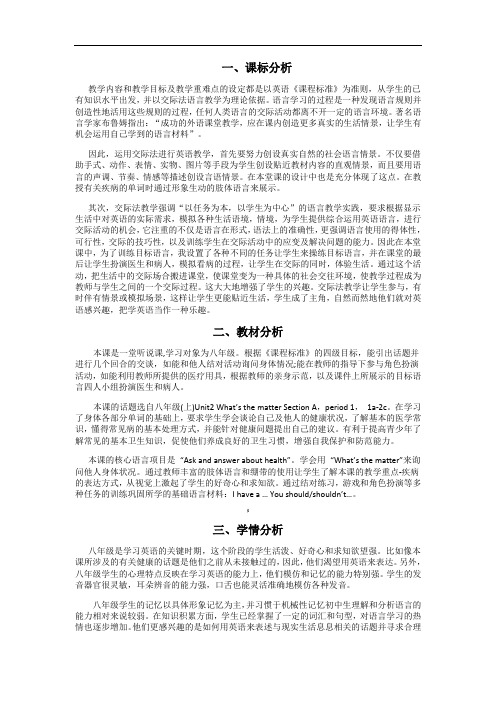
一、课标分析教学内容和教学目标及教学重难点的设定都是以英语《课程标准》为准则,从学生的已有知识水平出发,并以交际法语言教学为理论依据。
语言学习的过程是一种发现语言规则并创造性地活用这些规则的过程,任何人类语言的交际活动都离不开一定的语言环境。
著名语言学家布鲁姆指出:“成功的外语课堂教学,应在课内创造更多真实的生活情景,让学生有机会运用自己学到的语言材料”。
因此,运用交际法进行英语教学,首先要努力创设真实自然的社会语言情景。
不仅要借助手式、动作、表情、实物、图片等手段为学生创设贴近教材内容的直观情景,而且要用语言的声调、节奏、情感等描述创设言语情景。
在本堂课的设计中也是充分体现了这点。
在教授有关疾病的单词时通过形象生动的肢体语言来展示。
其次,交际法教学强调“以任务为本,以学生为中心”的语言教学实践,要求根据显示生活中对英语的实际需求,模拟各种生活语境,情境,为学生提供综合运用英语语言,进行交际活动的机会,它注重的不仅是语言在形式,语法上的准确性,更强调语言使用的得体性,可行性,交际的技巧性,以及训练学生在交际活动中的应变及解决问题的能力。
因此在本堂课中,为了训练目标语言,我设置了各种不同的任务让学生来操练目标语言,并在课堂的最后让学生扮演医生和病人,模拟看病的过程,让学生在交际的同时,体验生活。
通过这个活动,把生活中的交际场合搬进课堂,使课堂变为一种具体的社会交往环境,使教学过程成为教师与学生之间的一个交际过程。
这大大地增强了学生的兴趣。
交际法教学让学生参与,有时伴有情景或模拟场景,这样让学生更能贴近生活,学生成了主角,自然而然地他们就对英语感兴趣,把学英语当作一种乐趣。
二、教材分析本课是一堂听说课,学习对象为八年级。
根据《课程标准》的四级目标,能引出话题并进行几个回合的交谈,如能和他人结对活动询问身体情况;能在教师的指导下参与角色扮演活动,如能利用教师所提供的医疗用具,根据教师的亲身示范,以及课件上所展示的目标语言四人小组扮演医生和病人。
八年级英语上册Unit1Topic2I’llkickyoutheballagainPeriod1教学

Topic 2 I’ll kick you the ball again教学内容分析及课时分配建议:本单元以Playing Sports 为主题。
第二话题通过Section A Kangkang对Michael的邀请,引出对话的主题:合作参加足球比赛。
对话呈现了本课所要学的语法重点:subject + vt + indirect object + direct object。
结合本单元的话题I’ll kick you the ball again.呈现了重点短语:kick the ball to you, pass me the ball, practice doing sth, give me a hand等, 同时在对话中呈现了交际功能用语:Will you …? Would you mind (not) doing sth. ? 和Do you mind (not) doing sth? 帮助学生学会请求,提建议的表达法。
Section B通过Maria和Jane平息Kangkang和Michael的争吵,呈现了提建议的三种方式:Section C简单介绍了篮球的发展历史和运动规则。
Section D综合复习Sections A-C的词汇、语法和功能句,巩固学生本周的学习内容,并介绍了两种英国的球类运动football和cricket。
本话题的内容可以用5个课时来完成。
第一课时:Section A-1a, 1b, 1c, 2第二课时:Section B-1a,1b,1c, 2第三课时:Section B-4a,4b, Section A- 1d, Section B-3, Section C-2第四课时:Section C-1a,1b,1c第五课时:Section D-1a, 1b,Grammar and Functions, Project第一课时(Section A-1a, 1b, 1c, 2)教学设计思路:首先用足球赛的视频导入本课主题:I’ll kick you the ball again. 在pre-listening 部分提出三个问题让学生根据1a的图片猜测答案并浏览1b预测1a大意。
牛津深圳版英语八年级上册Module1Unit2Period1教学设计
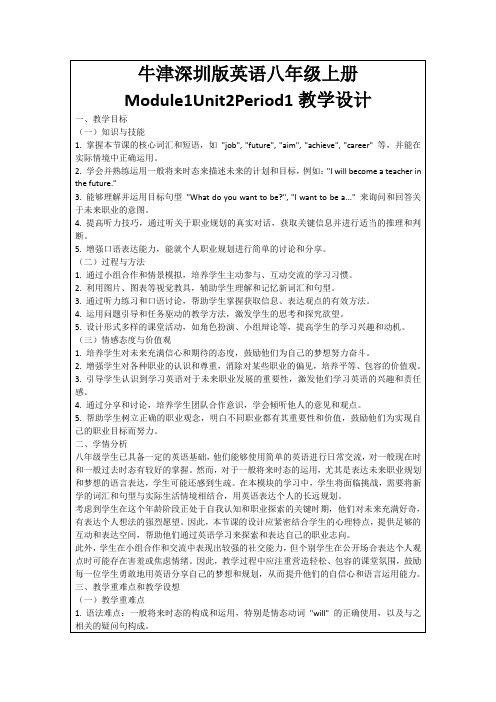
3. **家庭访谈活动**:鼓励学生在家中采访一位家庭成员或亲朋好友,了解他们的职业经历和规划。学生需要用英语记录下访谈内容,并整理成一篇访谈记录,以书面形式提交。
3.创设情景模拟,让学生在模拟面试或职业规划咨询的情境中,运用目标语言表达个人的职业理想,从而突破语言表达难点。
4.通过听力练习,如听职业规划的访谈录音,引导学生学习如何从对话中提取关键信息,提高听力技巧。
5.在情感交流方面,教师将通过正面评价和鼓励,以及小组间的相互支持,帮助学生建立自信,克服公开表达的恐惧。
4.口语实践:设计小组合作任务,让学生在小组内讨论自己的未来职业规划,然后向全班进行报告,以促进学生间的互动和口语表达。
5.听力训练:播放与职业规划相关的听力材料,引导学生进行信息捕捉和细节理解练习,提升听力技能。
6.情感交流:在小组和全班范围内,鼓励学生分享自己的梦想和规划,通过同伴支持和教师反馈,增强学生的自信心和表达欲望。
三、教学重难点和教学设想
(一)教学重难点
1.语法难点:一般将来时态的构成和运用,特别是情态动词"will"的正确使用,以及与之相关的疑问句构成。
2.语言表达难点:如何引导学生用英语表达个人的职业规划和梦想,包括使用适当的词汇和句型进行流畅的口语交流。
3.听力理解难点:学生在听力练习中,对快速对话的理解和关键信息的捕捉能力有待提高。
四、教学内容与过程
(一)导入新课
本节课开始时,我将采用图片导入法,展示一系列不同职业的图片,如医生、教师、科学家、艺术家等,激发学生的兴趣和好奇心。随后,提出以下问题引导学生思考和讨论:“What do you think these people do? Have you ever thought about what you want to be in the future?”通过这种方式,自然引入本课的主题——未来职业规划。
八年级英语上册人教版Unit 1 Where did you go on vacation?Period 1 Section A (1a-2d)课件

4. We watched a _w_o_n__d_e_rf_u_l_ (精彩的) game show last night. 5. ___F__e_w__(很少) people like that unfriendly young man.
二、根据汉语意思完成句子, 并背记英语句子 6. 你去哪里度假了? Where did you _____g_o____ ____o_n____ __v_a_c_a_ti_o_n__?
A. help
√ B. helped C. to help
D. helping
句意,—看我的新智能手机。—哇, 它太酷了,你何时何地买的它? 5. —Look at my new smart phone.
— Wow, it’s so cool. When and where ______you ______it?
用形容词“特殊的”修饰不 定代词时,形容词要后置。
7. 你昨天买什么特别的东西了吗? Did you buy _a_n_y_t_h_i_n_g_ __s_p_e_c_i_a_l _ yesterday?
在否定句和疑问句中表示“任何事物” 时用anything。
8. 嗨,好久不见! 考查交际用语 Hi. ____L_o_n_g__ __t_i_m_e____ _____n_o____ _____s_e_e___!
9. 我们见到了黄果树瀑布并在那儿拍了相当多的照片。 We saw Huangguoshu Waterfall and took __q_u_i_t_e__, ____a____ ____fe_w___ photos there. quite a few相当于many, 修饰可数名词复数。
most of…意为“…中的大多数” 10. 大多数时间我只是待在家里读书放松自己。
译林版英语八年级上册unit1学案

Unit 1 Period 1一、词组翻译1.青少年杂志2. 再吃些食物3. 一个诚实的男孩4.保密5. 使我快乐6. 相信他的话7.有困难8. 分享我的快乐二、用所给词的适当形式填空。
1. Lucy is always willing ____________________(share) things and help others.2. Max _______________(not do) any computer work after school yesterday.3. --Is Jack good at ____________(tell) jokes? --No, he isn’t.4. The man put on his hat and ____________(go) away.5. --What about ____________(drink) some tea?三、翻译下列句子。
1. ------你想来点喝的吗?------不,谢谢?2. 冰箱里没有什么东西了,你能帮我买些吗??3. 或许你能和我合用一个房间。
.4. 如果你学习英语有问题,我能帮你。
.5. 你认为什么使得你的朋友如此特别??四、综合训练Mr. Jones was very a_1__ with his wife and his wife was very angry with her husband. For a f__2__ days, they didn’t s__3_ to each other. One evening, Mr. Jones was very t__4_ when he came back from work, so he went to bed s_5_ after he went upstairs. Mrs. Jones washed the s__6__ things and did some sewing. When she went up to bed much l__7_ than her husband, she found a piece of paper on the small table near her bed. On it w__8_ the words, “Mother, wake me up at 7 a.m.—Father.” The next day, when Mr. Jones s__9_ woke up, he found it was 8 a.m. Also, he saw a big piece of paper on the table. It s__10_, “ Father, wake up. It is 7 a.m. –Mother.”1.a_________2.f__________3.s___________4.t___________5.s___________6.s_________7.l__________8.w__________9.s___________10.s_________Unit 1 Period 2一、词组翻译1.我最好的朋友之一______________________ 2.给有需要的人让座___________________3.和某人分享某物_______________________ 4.很有幽默感_________________________5.讲滑稽的笑话_________________________6.说别人的坏话_________________________7. 保密__________________________ 8.让我大笑_____________________________二、词汇运用1. Betty is (help). She’s always ready (help) people any time.2. He has a good sense of humour. I never feel (bore) or (happy)when I’m with him.3. The small round (glass) make him (look) smart.4. Are you (will) (sing) us an English song?5.------Can you give me something ______(drink) ? -----Yes, of course.6. When something (worry) me, I can always go to her.三、单项选择1.Many students are willing_______ hard to make their dreams come true .A, work B. to work C. working D. worked2.------Did you see the movie So Young last week?------Yes ,but I think it’s ______.I feel asleep when I saw it.A .exciting B. boring C. bored D. excited3.Kitty was careless .She ____the cup _____the ground.A. knocked; offB. knocked ;atC. knocked ;over D .knocked ;onto4.Mount Huang is more beautiful than____ in ChinaA. any other mountainB. any other mountainsC. other mountainsD. any mountains5.Funny jokes can always make us________ when we are sad.A. laughingB. laughC. laughedD. laughs四、综合训练To Lose Some WeightA young man was sitting by the road and eating something. A policeman was coming over to him. The man got up quickly and ran down the road when he saw the policeman . The policeman ran after him right away. The man ran fast, but the policeman ran much faster than him. After a few minutes, the policeman caught him. “Where are you going, young man?” the policeman asked him. “You must be a criminals(罪犯) if you run like that when you see a policeman.” “No, no,”said the man quickly, “I am not a criminal. I am just too fat. You see, the doctor tells me that I must run fast after eating something.” “I see”, said t he policeman, “You are running to help to lose some weight(减肥)”.( )1. A young man was sitting by the road and something.A. lookingB. seeingC. eatingD. drinking( )2. Just at that time, a was coming.A. busB. manC. friendD. policeman( )3. What did the young man do when he saw the policeman?A. He said “Hello” to him.C. He was waiting for him. B. He got up and ran away.D. He cried at once.( )4. The policeman ran after the young man because .A. he was catching a busC. he thought he was a bad man B. he knew himD. the young man was a criminal( )5. Why did the young man run? Because .A. he saw his friend C. he saw a policemanB. he wanted to catch a busD. the doctor told him to run after eatingUnit 1 Period 3一、词组翻译1.愿意做某事 2时刻准备帮助别人3.与某人分享某物4.一个忠实的朋友5.需要帮助的人6.把某物撞翻到地上7.使我大笑 8. 很有幽默感二、词汇运用1. Kate wants to be a (sing) when she (grow) up.2. He has a good sense of humour. I never feel (bore) or (happy) when I’m with him.3. She has a (wonder) friend (name) Kitty.4. Are you (will) (sing) us an English song?5. When something (worry) me, I can always go to her.三、翻译句子1. 她穿那条粉色的裙子非常合适。
- 1、下载文档前请自行甄别文档内容的完整性,平台不提供额外的编辑、内容补充、找答案等附加服务。
- 2、"仅部分预览"的文档,不可在线预览部分如存在完整性等问题,可反馈申请退款(可完整预览的文档不适用该条件!)。
- 3、如文档侵犯您的权益,请联系客服反馈,我们会尽快为您处理(人工客服工作时间:9:00-18:30)。
robot
Did people have robots in their homes 100 years ago? Do people have robots in their homes now? Will people have robots in their homes in 100 years ?
书只会在电脑上,而不会在纸上. 书只会在电脑上,而不会在纸上.
___A___D 4.Kids won’t go to school. They’ll study at home on computer.
孩子们将不上学.他们在家用电脑学习. 孩子们将不上学.他们在家用电脑学习.
___A___D 5.There will only one country.
People will have robots in their homes.
否定句: 即可。 否定句:在will 的后面加not即可。will not = won’t
People will not (=won’t) have robots in their homes.
一般疑问句: 提到句子主语之前,结尾变问号。 一般疑问句:把will 提到句子主语之前,结尾变问号。
Will people have robots in their homes? Yes , they will ./ No , they won’t .
will 引导的一般将来时 一般将来时表示将来发生的动作或情况, 引导的一般将来时:一般将来时表示将来发生的动作或情况 一般将来时表示将来发生的动作或情况, 最基本的结构: 最基本的结构:will + 动词原形
“主谓(宾)句型”的一般将来时: 主谓( 句型”的一般将来时: 肯定句:主语 动词原形+(宾语) 其他成份 肯定句:主语+ will +动词原形 (宾语)+其他成份 动词原形
in the future
A B. C dfaoptj. 12 + =? ?。。。
Kids won’t go to school. They’ll study at home on computers.
= they will
in the future
There will only be one country. People will live to be 200 years old.
Will
every
home have a car? Yes ,they will They will have a car. car.
Will these be true in the future?
___A___D 1.People will have robots in their homes.
A: I bet kids won’t go to school. They’ll__________________________. study at home on computers B: Oh, I disagree. A: You do? B: Yeah, there will always be schools.
世界上只有一个国家. 世界上只有一个国家.
___A___D 6.People will live to be 200 years old.
人们将会活到 岁 人们将会活到200岁. 活到200
1.人们家里将有机器人。 人们家里将有机器人。 人们家里将有机器人 People will have robots in their homes. 2.人们将不再用钱了。所有的东西都将免费。 人们将不再用钱了。所有的东西都将免费。 人们将不再用钱了 People won’t use money. Everything will be free. 3.书本只出现在电脑上,不再是纸做的。 书本只出现在电脑上,不再是纸做的。 书本只出现在电脑上 Books will only be on computers,not on paper. 4.孩子们将不上学。他们将在家里通过电脑学习。 孩子们将不上学。他们将在家里通过电脑学习。 孩子们将不上学 Kids won’t go to school. They’ll study at home on computers. 5.将来只有一个国家了。 将来只有一个国家了。 将来只有一个国家了 There will only be one country . 6.人们将活到 人们将活到200岁。 岁 人们将活到 People will live to be 200 years old.
Unit 1
Will people have robots?
Did people use computers 100 years ago? Do people use computers now? Will people use computers 100 years later? ? Yes, they will. No, they won’t.
人们在家将有机器人. 人们在家将有机器人.
___A___D 2.People won’t use money. Everything will be free.
人们将会不用钱.所有的东西都是免费 人们将会不用钱.所有的东西都是免费的. 免费的
___A___D 3.Books will only be on computer,not on paper.
Will people live to be 200 years old ?
1b.Listen and circle the predictions you hear in activity 1a.
1.People will have robots in their homes. 2.People won’t use money. Everything will be free. 3.Books will only be on computers, not on paper. 4.Kids won’t go to school. They’ll study at home on computers. 5. There will only be one country. 6. People will live to be 200 years old.
A: Do you think people will have robots in 100 years in their homes ________________? a robot on TV cleaned the kitchen B: Yes, I do. I saw____________, and it_________________ . A: Well, I don’t think people will ______ money. use B: Do you think everything______________? will be free A: Yeah, probably. will be B: I think there __________only one country. A: Only one country ___________________? in the whole world Will there be ___________ ? world peace B: I hope so.
Tapescript: people will have robots in A:Do you think _______________________ A:Do their homes ___________in 100 years? B:Yes,I do. I saw a robot on TV, and it B:Yes,I TV, cleaned the kitchen. A:Well, ______________________________. A:Well, I don’t think people will use money everything will be free B:Do you think____________________? B:Do A: Yeah, probably大概,或许. there will be one country B:I think______________________. B:I A:Only one country in the whole world? Will A:Only there be world peace 和平? B:I hope so. B:I so.
a piece of paper
Did people use paper 100 years ago? Do people use paper now? Will people use paper in 100 years? ?
Do you think the world will be different in the future? ? What do you think will happen in 100 years? Will people use money? Will everything be free? Will kids go to school? Will people just go shopping at home? ……
robot
People will have robots in their homes.
in the future
People won’t use money. Everything will be free.
使用
won’t= will not
免费的
in the future
Books will only be on computers, not on p robots in their homes ? Will people use money in 100 years ? Yes, they will. will. Will books be only on computer ? Will kids go to school ? Will they study at home ? Will there only be one country ? No, they/ there won’t . they/
